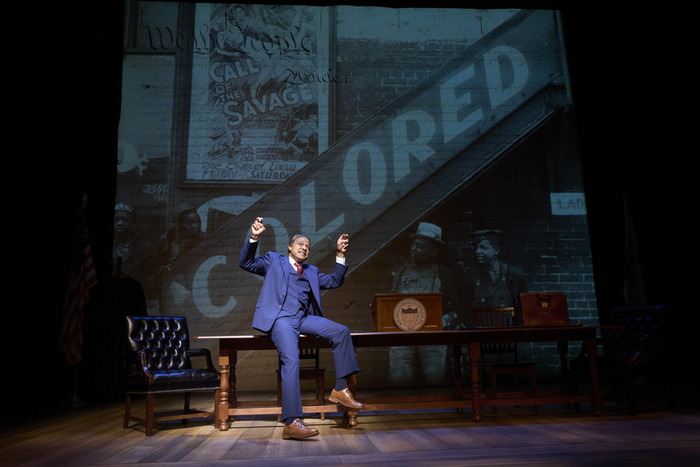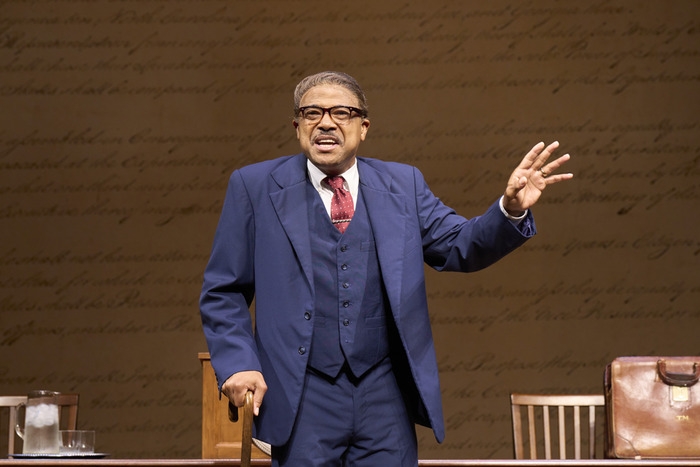
Thurgood Marshall, the subject of Thurgood, now on stage at Cleveland Play House’s Allen Theatre, was the grandson of slaves. He was born in segregated Baltimore and attended all-Black schools. After high school he enrolled at Lincoln University, the oldest college for African Americans in the United States. Marshall desired to go to law school but was not allowed into the all-white University of Maryland. Instead, he attended Howard University Law School.
When asked about why he wanted to go to law school, he said that his father, who was an important influence in his life, “never told me to become a lawyer, but he turned me into one … He taught me how to argue, challenged my logic on every point, by making me prove every statement I made, even if we were discussing the weather.”
And what a lawyer he was. Often referred to as “Mr. Civil Rights,” he devoted his life to championing justice and equality for all people.
Prior to his judicial service, he was an attorney who fought for civil rights, leading the NAACP’S Legal and Education Fund. He won 29 of the 32 civil rights cases he argued before the Supreme Court, culminating in the court’s landmark 1954 decision in Brown vs. Board of Education, which rejected the separate but equal doctrine and held segregation in public education to be unconstitutional.
Though many think only of Martin Luther King, Jr. as the central lynch point of the civil rights movement, the role of Marshall cannot be overlooked. King fought outside the system to make his strides, Marshall worked within the system to change laws and legally make change.
Marshall’s motivation was often credited to his education at Howard, where he was taught to be a “social engineer,” willing to use the law to fight for civil rights.
He was appointed by Lyndon Johnson to be the Supreme Court’s first African-American justice. Marshall served as an associate justice from 1967 until 1991. A staunch liberal, he frequently dissented as the Court became increasingly conservative.
Thurgood, his biographical play as written by George Stevens, Jr., spans his remarkable 58-year career while highlighting his warmth and sharp wit.

The CPH production stars film, TV, and regional theatre veteran Lester Purry. He has performed this script at Geva Theatre Center, Portland Playhouse and Penumbra Theatre.
Purry doesn’t act the role, he merges himself into the character so that there is no doubt we are sharing the two-hour, two-act play with Marshall himself. His asides to the audience are Marshall’s asides. His sorrows become our real sorrows. His joys, our joys. What a pleasure to see this marvelous actor onstage.
Purry’s lines were often interrupted by applause. This was not only a tribute to the actor’s performance, but to the knowledge and power of Marshal’s ideas and stances.
Award-winning Clevelander Greg White understudies Purry and may perform at some stagings.
The action takes place on one-set, but is visually enhanced by Rasean Davonte Johnson’s compelling projections.
Capsule judgement: Thurgood is not only is a wonderful historical epic, but is wonderful entertainment. Dramatic, humorous, well performed and clever — it makes for a marvelous must-see theatrical experience.
Thurgood runs through October 1. For tickets call 216-400-7000 or go to clevelandplayhouse.com/.
Next up at Cleveland Play House, October 21-November 11: Mary Shelley’s Frankenstein. “A gritty yet highly theatrical tale that brings what’s buried back to life.”
[Written by Roy Berko, member: American Theatre Critics Association, Cleveland Critics Circle]